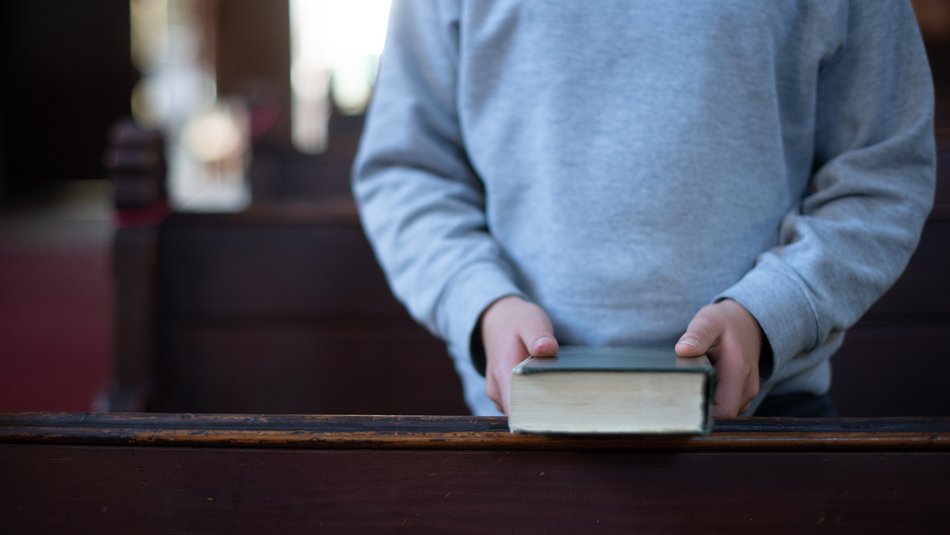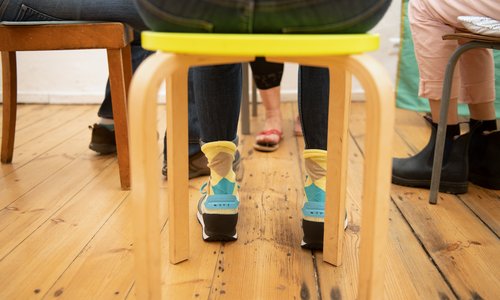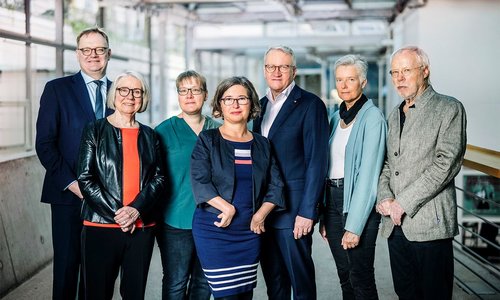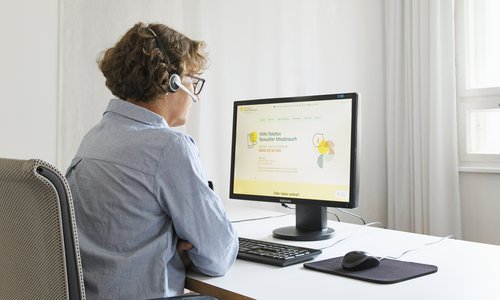
With the aim of supporting independent investigation within the dioceses of the German Bishops' Conference (GBC), in the religious orders of the GCSRO (German Conference of Superiors of Religious Orders) and in the regional churches of the Evangelical Church in Germany (ECG) in accordance with uniform standards and criteria, an "Ecclesiastical Inquiry" working group was formed at UBSKM, which together with representatives from the various churches, is developing so-called "joint declarations" covering how investigations should be implemented within the separate ecclesiastical structures.
History
The GBC presented a study entitled "Sexual abuse of minors by Catholic priests, deacons and male members of religious orders that come under the mandate of the GBC” on the 25th of September 2018. Personnel files from all 27 dioceses in Germany were examined and evaluated as part of this "MHG study" - its name being derived from the three participating universities (Mannheim, Heidelberg and Giessen).
Against the background of this published study, UBSKM established its “Ecclesiastical Inquiry” working group in December 2018, in which members of the Independent Inquiry and UBSKM’s own survivors’ board also participate. It has developed criteria for a comprehensive clarification and an independent investigation in the ecclesiastical context and entered into talks and negotiations with the both Catholic and Evangelical churches as well as Catholic religious orders.
Members of the “Ecclesiastical Inquiry” working group include:
- Johannes-Wilhelm Rörig, from UBSKM
- Dr Christine Bergmann, from the Independent Commission
- Matthias Katsch, from the Indepentent Commission
- Prof. Heiner Keupp, from the Independent Commission
- Kerstin Claus, from the survivors’ board at UBSKM
- Karl Haucke, from the survivors’ board at UBSKM
- Dr Manuela Stötzel, head of the working staff of UBSKM
- Susanne Fasholz-Seidel, head of the Office of the Independent Commission
More detailed information about the MHG study can be found here:
MHG study (German Bishops' Conference)
Essential key points for reappraising investigating in an ecclesiastical context
Independent investigation needs an external perspective and it cannot be carried out solely from within the institution itself. At the same time, structural investigation cannot function without the assumption of responsibility and participation by the institutions involved. It was against this background that the “Ecclesiastical Inquiry" working group developed three essential key points for successful investigation in an ecclesiastical context: independence, transparency and survivor participation.
Independence during investigation means that the questions of whether, how and by whom investigation is undertaken must not be the (sole) decision of the church. External experts must be involved as much as possible, as they, through their representation and chairmanship of the various reappraisal committees that have to be established will be able to ensure that they are not subjected to professional supervision by the church.
Transparency will be ensured in particular through the publishing of regular reports.
Investigation without survivor participation cannot work. They must be equal members of the investigation committees and also have the opportunity to participate in all areas of investigation on an equal basis and help shape them as well.
In December 2019 the UBSKM office published the recommendations made by its Independent Inquiry into Child Sexual Abuse regarding investigation processes in institutions.
Catholic church - Dioceses
On the 22nd of June 2020, the Independent commissioner, Johannes-Wilhelm Rörig and Bishop Dr Stephan Ackermann, GBC representative for questions about sexual abuse in the church sector and for questions about child and adolescent protection, signed a "joint declaration covering the binding criteria for the independent processing of sexual abuse in the Catholic church in Germany". Having considered the central key points of independence, transparency and survivor participation, this "joint declaration" provides for the establishing of diocesan investigation commissions (with the state governments participating in appointing the members) as well as the creation of structured survivor participation, especially in the form of advisory councils.
The investigation commissions are free to organise their own work and they should also make a further contribution to quantifying sexual abuse in the dioceses, to investigating how survivors and perpetrators are treated and to identifying structures that have made sexual abuse easy and possible as well as those that make it more difficult to uncover. They are also obliged to submit and publish an annual report on the state of investigation in their respective dioceses. All of the dioceses have now begun to implement the "joint declaration" and the commissions have already started their work in many places.
In October 2024 the symposium which is codified in the Joint Declaration and the interim evaluation intended in this framework take place.
The "joint declaration" with the GBC and more information about its signing.
An overview of the "joint declaration” implementation statuses in the dioceses.
Catholic church - Religious orders
The "joint declaration" concluded between the UBSKM and the GBC does not apply to the almost 400 religious orders here in Germany, all of which operate within their own structures. This is why the independent commissioner, Johannes-Wilhelm Rörig, and the chair of the GCSRO, Sister Dr Katharina Kluitmann OSF, signed the "joint declaration on binding regulations for an independent reappraisal of sexualised violence in religious orders" on the 17th of May 2021.
This declaration is mainly based on the "joint declaration" agreed with the GBC, but it also takes into consideration the very different structures within the separate religious orders. Establishing an "independent investigation committee" at GCSRO level is also planned. Its special task will be monitoring specific investigation projects within the religious orders. This will be carried out by "investigation teams", which will be authorised specialist institutes or scientists. The teams should be actively supported in their work by survivors’ boards. The GCSRO is currently trying to establish the committee so that it can start the investigation.
The "joint declaration" with the GCSRO and more information about its signing.
Evangelical church
The focus within the ECG to date has been on specific investigation, especially with the aim of establishing a procedure for recognition payments to be made by the so-called "recognition commissions". Back in December 2020, a wide-ranging research project was also launched by the ForuM research association (research into investigating sexualised violence and other forms of abuse in the Evangelical church and diakonia in Germany), whose objective is a complete analysis of Evangelical structures and the systemic conditions that abet sexualised violence and make it difficult to investigate it. The study consists of a total of five sub-projects and it should be completed by autumn 2023. The ECG is also in parallel negotiations with UBSKM and the “Ecclesiastical investigation" working group with regard to concluding a "joint declaration" covering the Evangelical church sector. The ForuM study was completed and published in January 2024. On December 13, 2023, the EKD and Diakonie Deutschland signed the “Joint Declaration” between the EKD, Diakonie Deutschland and UBSKM following negotiations with the UBSKM and the “Ecclesiastical Inquiry" working group.
The signatories are Anne Gidion, Representative of the Council of the EKD to the Federal Republic of Germany and the European Union, Ulrich Lilie, President of Diakonie Germany and the Independent Federal Commissioner Against Child Sexual Abuse (UBSKM), Kerstin Claus. The EKD, Diakonie Deutschland and UBSKM have agreed on binding criteria and standards for a comprehensive and independent investigation of sexualized violence in the Protestant Church and Diakonie. The “Joint Declaration” was drawn up by the EKD, Diakonie and UBSKM as well as representatives of those affected and church representatives from the Participation Forum on Sexualized Violence (BeFo) and the “Ecclesiastical Inquiry" working group set up by UBSKM. The “Joint Declaration” is intended to achieve the independent, comprehensive and transparent processing of sexualized violence according to nationally comparable standards in all Protestant regional churches and the diaconal regional associations. In accordance with the “Joint Declaration”, “Independent Regional Reappraisal Commissions” will be established, which will begin their work as soon as possible.
Information on the ForuM study
The “Joint Declaration” with the EKD and Diakonie Deutschland
Interpretation aid for the “Joint Declaration” with the EKD and Diakonie Deutschland




